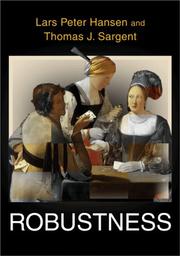| Listing 1 - 2 of 2 |
Sort by
|
Book
ISBN: 8847019702 8847019710 1283935767 Year: 2011 Publisher: Milan : Springer-Verlag,
Abstract | Keywords | Export | Availability | Bookmark
 Loading...
Loading...Choose an application
- Reference Manager
- EndNote
- RefWorks (Direct export to RefWorks)
The recent economic events driven by the big financial crisis of 2007-08 has cogently put to the fore the limits and drawbacks of the ruling research paradigm in macroeconomics. This volume goes to the root of the problem by offering a workable alternative to the renowned issue of the microeconomic foundations of macroeconomic theory. Bringing together techniques from agent-based computational economics and statistical validation, the authors set the stage for a paradigmatic shift, elaborate on it with practical examples and provide an agenda for future research. .
Macroeconomics -- Decision making. --- Macroeconomics -- Econometric models. --- Macroeconomics -- Economic policy. --- Macroeconomics -- Forecasting. --- Macroeconomics. --- Macroeconomics --- Business & Economics --- Economic Theory --- Economics. --- Economic theory --- Political economy --- Statistics. --- Microeconomics. --- Industrial organization. --- Economic growth. --- Macroeconomics/Monetary Economics//Financial Economics. --- Economic Growth. --- Statistics for Business/Economics/Mathematical Finance/Insurance. --- Industrial Organization. --- Economics --- Social sciences --- Economic man --- Statistics for Business, Management, Economics, Finance, Insurance. --- Price theory --- Development, Economic --- Economic growth --- Growth, Economic --- Economic policy --- Statics and dynamics (Social sciences) --- Development economics --- Resource curse --- Industries --- Organization --- Industrial concentration --- Industrial management --- Industrial sociology --- Statistical analysis --- Statistical data --- Statistical methods --- Statistical science --- Mathematics --- Econometrics --- Statistics .

ISBN: 0691114420 0691170975 1400829380 9780691114422 9781400829385 Year: 2011 Publisher: Princeton, NJ : Princeton University Press,
Abstract | Keywords | Export | Availability | Bookmark
 Loading...
Loading...Choose an application
- Reference Manager
- EndNote
- RefWorks (Direct export to RefWorks)
The standard theory of decision making under uncertainty advises the decision maker to form a statistical model linking outcomes to decisions and then to choose the optimal distribution of outcomes. This assumes that the decision maker trusts the model completely. But what should a decision maker do if the model cannot be trusted? Lars Hansen and Thomas Sargent, two leading macroeconomists, push the field forward as they set about answering this question. They adapt robust control techniques and apply them to economics. By using this theory to let decision makers acknowledge misspecification in economic modeling, the authors develop applications to a variety of problems in dynamic macroeconomics. Technical, rigorous, and self-contained, this book will be useful for macroeconomists who seek to improve the robustness of decision-making processes.
Robust optimization --- Robust control --- Robust control. --- Robust optimization. --- -330.0151 --- 305.6 --- AA / International- internationaal --- Economics --- -Macroeconomics --- Economic theory --- Political economy --- Risicotheorie, speltheorie. Risicokapitaal. Beslissingsmodellen. --- Mathematical models --- Decision making --- Econometric models --- Kalman filtering --- Macroeconomics --- 330.0151 --- Optimization, Robust --- RO (Robust optimization) --- Mathematical optimization --- Robustness (Control systems) --- Automatic control --- Filtering, Kalman --- Control theory --- Estimation theory --- Prediction theory --- Stochastic processes --- Econometrics --- Risicotheorie, speltheorie. Risicokapitaal. Beslissingsmodellen --- E-books --- Kalman filtering. --- Econometric models. --- Decision making. --- Economics, Mathematical --- Econometría |2 UTDT --- Economía |x Modelos matemáticos |2 UTDT --- Macroeconomics - Decision making
| Listing 1 - 2 of 2 |
Sort by
|

 Search
Search Feedback
Feedback About UniCat
About UniCat  Help
Help News
News